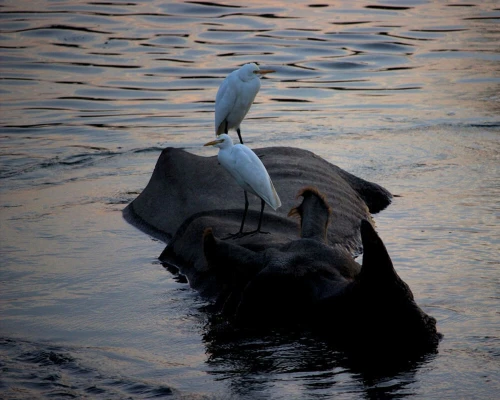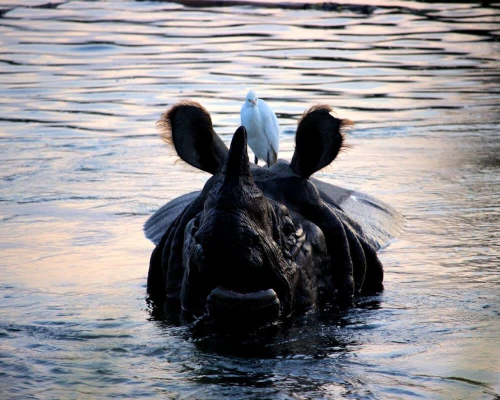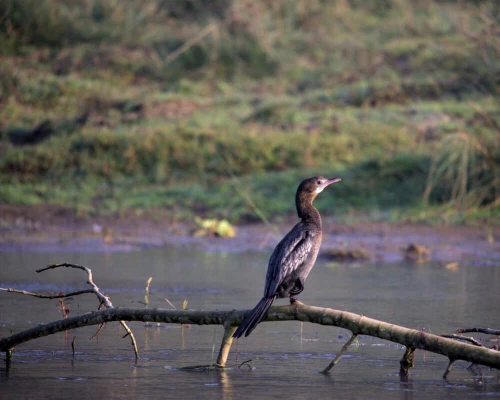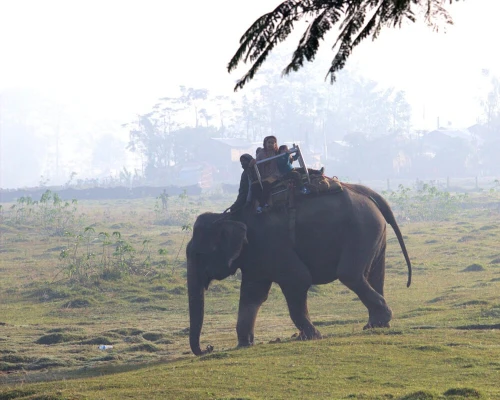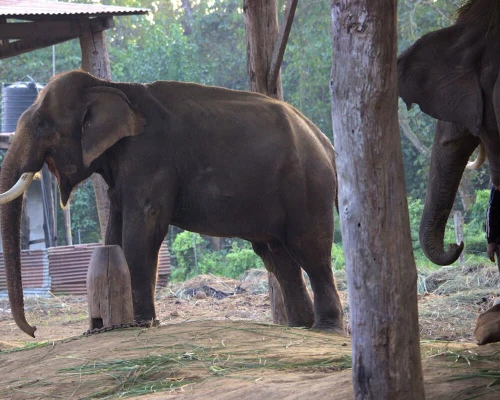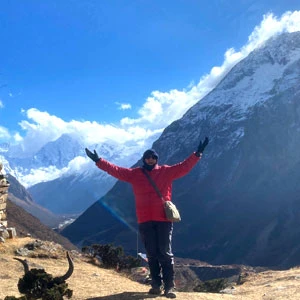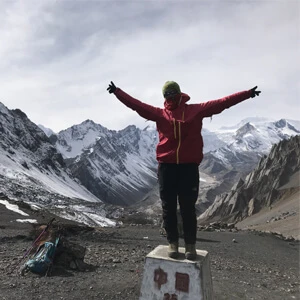Two Nights, Three Days Chitwan Jungle Safari
Chitwan National Park is a UNESCO-listed heritage site renowned throughout the world for its exceptional and diverse range of wildlife that includes some of the greatest numbers of one-horned rhinos and Bengal tigers to be found in Asia, as well as a host of other animals including leopards, jackals, crocodiles, monkeys, pangolins, sloth bears, deer, various kinds of birds, and a wide variety of butterflies.
Chitwan National Park is located five hours away from Kathmandu, and after our arrival by bus, several opportunities exist to explore Nepal’s premier national park and the subtropical lowlands of forests, grasslands, and flood plains that it consists of, as well as the traditional Tharu villages that adjoin the park.
Among the many highlights available during our stay are nature walks, canoeing, bird watching, ox-cart rides, Tharu cultural experiences, and elephant bathing, though the jewel in the crown for most visitors is the unique opportunity to travel through the park on a jeep safari and view the abundant wildlife on offer. That includes, if we’re fortunate on the day, the magnificent Bengal tiger and even perhaps one of the wild bull elephants that occasionally roam into the park looking for mates.
Whether it’s a one-day visit or a multi-day experience in Chitwan, Nepal Trekking Experts can arrange a suitable stay that will fulfill all your requirements. If you have time and flexibility, we highly recommend a 3-night, 4-day Chitwan Safari rather than a 2-night, 3-day safari. It costs an additional $50 per person. You may also prefer the most interesting and richest safari, Bardiya Jungle Safari. Feel free to contact our staff to discuss all the options.
Key Attractions During Chitwan Safari
Wildlife
The Chitwan National Park is home to diverse animals and birds and this tour gives you an opportunity to witness them in their natural habitat. Some of the common sightings you will have include the spotted deer, sloth bear, wild boar, monkey, Bengal fox, honey badger, leopard, and jackal. For the lucky few, rare sightings include the Bengal tiger, pangolin, and gharial crocodile with the fascinating introduction of the endangered one-horned rhinoceros. Furthermore, one of the thrilling highlights of this tour is the visit to the breeding center of crocodiles and elephants.
Moving on, birdwatchers are also in for a treat, with the availability of over 600 different species of birds in the area. Commonly spotted species include colorful kingfishers, storks, egrets, parakeets, woodpeckers, spotted eagle, jungle fowl, and hawks. If you are lucky enough, you may also get rare sightings of the critically endangered Bengal florican and the giant hornbill. Similarly, do not forget about the vibrant array of insects. You will come across butterflies (such as the common Mormon, lime butterfly, and vibrant blue tiger), beetles, and dragonflies.
Flora
The Chitwan National Park showcases a subtropical ecosystem that is primarily covered with sal forests. Alongside Sal, you will encounter kapok trees (known for their striking buttress roots) and banyan trees (known for their aerial roots). Here, some of the rare plant species include the sissoo tree and khair tree and you will often find it along the riverbanks. On top of that, you will also find several medicinal plants like asparagus and datura.
Apart from these plants, you will also see grasslands with shrubs and vines. Generally, the grassland is dominated by the elephant grass. Now, some of the blooms you may see include lotus, wild jasmine, and moonflower.
Culture
Visiting Chitwan also fills you with opportunities to witness the traditions of its indigenous people, the Tharu community. They are known as the original inhabitants of the Terai region and their lifestyle is centered around farming, fishing, and forest gathering. Walking through the local villages, you will notice their unique mud-and-thatch houses adorned with intricate artwork.
During the tour, you will get to visit the Tharu Cultural Museum where you will see various artifacts, including traditional tools, costumes, and religious items. As the day ends, the night comes alive with traditional Tharu stick dance which is one of the major highlights of the tour. During this dance, they will dress up in colorful attire and they use sticks to dance in the rhythmic beat.
Historically, Chitwan used to be the royal hunting ground in the mid-20th century. Over the years, the region transitioned from a hunting reserve to a conservation hub.
Activities
The Chitwan Jungle Safari Tour is all about thrilling activities. Among the most popular experiences is the jeep safari, a guided adventure that takes you deep into the park's core. Riding through dense sal forests and expansive grasslands, you can spot diverse wildlife, from the elusive Bengal tiger to herds of spotted deer. For a more traditional approach, some visitors opt for an elephant safari. Both options offer unforgettable encounters with nature and opportunities to witness animals in their natural habitats.
Additionally, you can also experience canoe ride in Rapti river. Here, you will get to enjoy the close-up view of the crocodile basking in sun at the riverbanks. another highlight is the jungle walk. You will be accompanied by experienced guide and you will get to explore the raw wilderness and even get a chance to track animal footprints.
Best Time For Wildlife Tour In Chitwan
Fun fact: Chitwan experiences three major seasons: Summer (March to May), Monsoon (June to September), and Winter (October to February). Here, the best timeline for the Chitwan Safari would be during Winter.
Winter brings cool weather, clear skies, and excellent visibility for spotting animals. Since most of the water sources shrink, wildlife is drawn to rivers and open grasslands hence, you will have a better probability of witnessing animals. Likewise, birdwatching is also at its peak, as migratory birds join the park’s already impressive resident species.
While the Summer season is also great for the tour, the weather is quite hot. The day can get difficult with intense heat but the evenings and mornings still remains cool. Additionally, it is also mating season for many species and you may be able to witness unique activities.
Lastly, we do not recommend you to take this tour during Monsoon. While the forest comes alive with lush greenary however, the trails are slippery and muddy with heavy rainfall. Additionally, many parts of the park also get inaccessible and sightings can be more challenging. Also, you may face the potential risk of flood and wrecked roads.
Permit Required For Chitwan Jungle Safari
To visit the Chitwan National Park, you will need the Chitwan National Park Entry Permit. This permit will cost you NRs 2,000 per person per day and it is free for children below 10 years old. This permit is mandatory for anyone entering the park, whether for a jeep safari, canoe ride, or jungle walk. You can get this permit at the park's entrance or if you are traveling by a local agency, they can help you secure it beforehand. Also, the process for obtaining is quite straightforward and you will require your valid ID.
Why Chitwan Jungle Safari with Nepal Trekking Experts?
Nepal Trekking Experts ensures that your safari is filled with awe-inspiring wildlife encounters, cultural insights, and memories to last a lifetime. From the comfortable rides to and from the park to the full-board meals and cozy accommodations, every aspect of your safari is handled with the utmost care.
With our experienced guides, you get to explore Chitwan’s wilderness, uncovering its hidden treasures and natural wonders. Contact us today for a budget Chitwan Safari package that goes beyond the ordinary, where every moment is a step into the wild and wonderful world of Chitwan.


